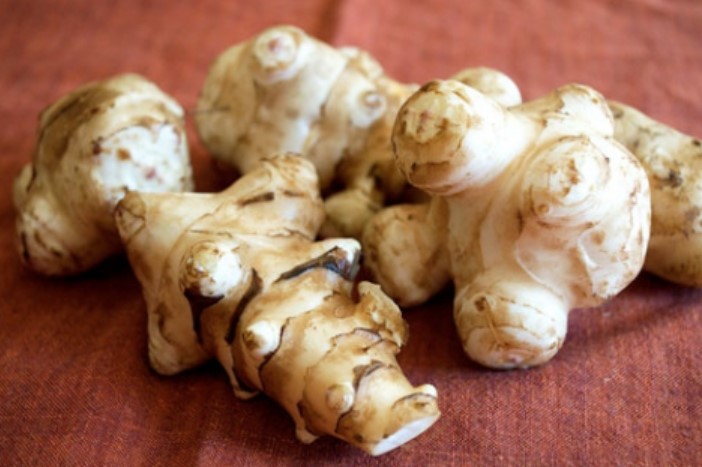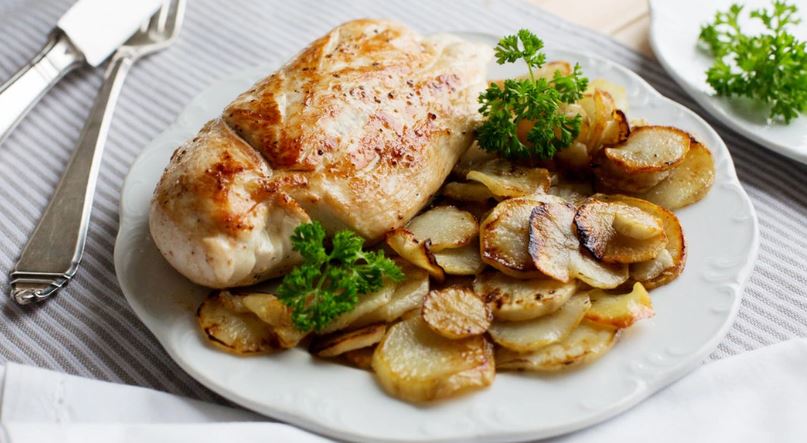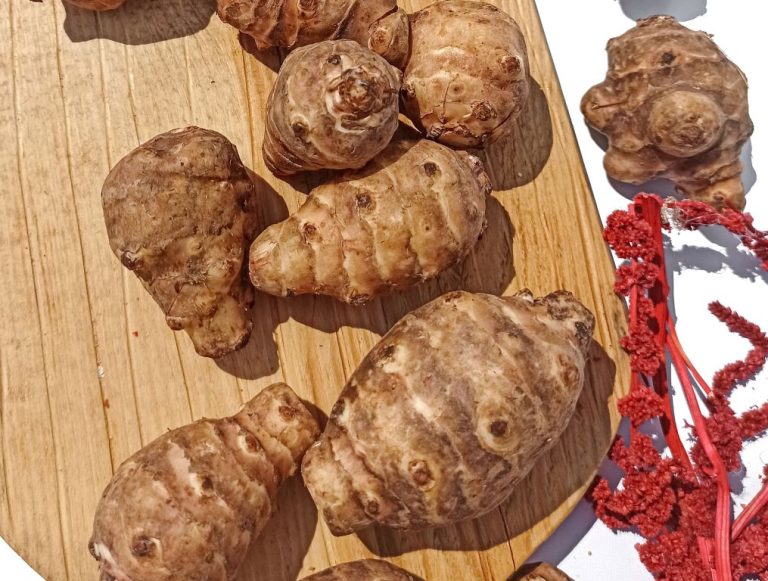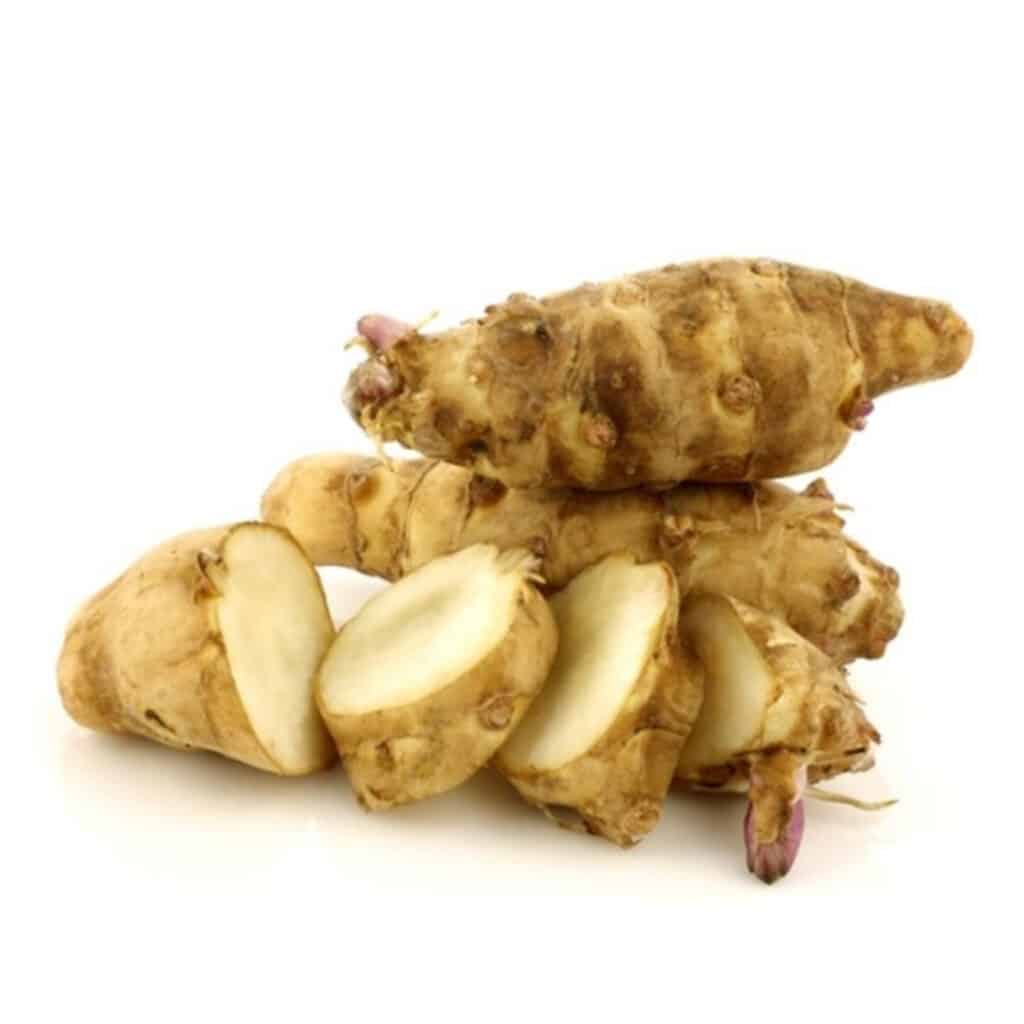Jerusalem artichoke is a healthy root vegetable. It is rich in vitamins and full of fiber. Its high inulin content has also earned it the name “diabetic potato”. We present three Jerusalem artichoke recipes.
Jerusalem artichokes are rich in vitamins and fiber. They contain B vitamins, magnesium and iron, among other things. Since Jerusalem artichokes contain the fiber inulin, they ensure a constant blood sugar level. This property has earned it the name diabetic potato, as it is a good alternative to potatoes for people with diabetes.
Jerusalem artichokes taste slightly nutty and somewhat sweet, which makes them an interesting component for numerous delicacies such as salads, soups, casseroles or spreads.
You can buy the healthy tubers fresh between October and April. Keep in mind that Jerusalem artichokes only keep for a few days. If you don’t use them directly, you should store them in the fridge. When preparing Jerusalem artichoke, there are also a few things to keep in mind.
Nutritional values and ingredients of Jerusalem artichoke

In addition to its delicious taste, Jerusalem artichoke is also healthy: the root vegetable convinces with good nutritional values and important ingredients.
100 grams of Jerusalem artichoke have the following nutritional values:
Energy: 30 kcal
Carbohydrates: 4g
Protein: 2.4g
Fat: 0.3g
Fiber: 12.1 g
With just 30 kilocalories per 100 grams of Jerusalem artichoke, the tuber is a calorie lightweight. However, it provides an even larger portion of dietary fiber. These are responsible for many of the tuber’s health-promoting effects (see below).
Minerals and vitamins per 100 grams Jerusalem artichoke:
Calcium: 10 mg
Iron: 3.7 mg
Potassium: 478 mg
Magnesium: 20 mg
Sodium: 3 mg
Phosphorus: 78 mg
Vitamin B1: 200mcg
Niacin: 1.3 mg
Jerusalem artichoke has healthy vitamin B, which is important for metabolism and blood formation, among other things. The minerals and trace elements contained in the root tuber include calcium, iron, potassium, magnesium, sodium and phosphorus.
Calcium strengthens bones, teeth and cell walls.
Potassium ensures that the stimulus transmission of the muscles works properly. A potassium deficiency can therefore lead to muscle cramps.
Magnesium performs numerous important functions in the body, such as transmitting stimuli from nerves to muscles and stabilizing the cardiovascular system.
Sodium is part of the bone structure and regulates the acid-base balance, among other things.
Along with calcium, phosphorus is the most important component of our bones. Cell membranes also contain the mineral and muscles need it to convert energy into movement.
Healthy Jerusalem Artichoke: Ideal source of inulin
Jerusalem artichoke is rich in fiber inulin (not to be confused with the hormone insulin), which our organism cannot digest. Inulin can have extremely beneficial effects on health.
Inulin has a prebiotic effect
The natural intestinal flora contains useful bifidobacteria that ensure good intestinal function. If you eat Jerusalem artichoke, the fiber inulin gets into the large intestine, where it is broken down by the bacteria. The bacteria use inulin as an energy source and multiply. Inulin is therefore considered a prebiotic because it has such a positive effect on the intestinal flora. A study by the University of Leipzig confirms this.
Inulin activates digestion and relieves constipation
In general, inulin binds liquids and swells up. It promotes bowel movements and ensures regular excretion.
The Apotheken-Umschau writes about inulin in general that it is suitable for a diabetes-friendly diet:
Inulin has few calories: The body cannot use the plant-based energy in inulin – so there are hardly any calories.
Inulin keeps you full: The swollen inulin makes you feel full for longer.
Inulin regulates blood sugar levels: blood sugar remains more constant because the metabolism absorbs other nutrients more slowly.
Studies also indicate that the dietary fiber inulin makes it easier for the body to absorb calcium for the bones.
But be careful: Although Jerusalem artichoke has healthy effects, it can also have unpleasant side effects. Excessive consumption of the peel and the raw tuber in particular can lead to flatulence and even diarrhea. This is due to the large amount of roughage, the digestion of which often causes the intestinal flora to slowly adapt to the high-fibre vegetables.
Cook the Jerusalem artichoke
Whether you should peel the Jerusalem artichokes depends on the size of the tuber. You don’t need to peel small, tender bulbs. Here it is sufficient if you clean them with a vegetable brush. Larger tubers, on the other hand, also have a firmer shell. You can peel these off with a paring knife or remove them after cooking.
If your digestion is used to high-fiber food, you can safely eat Jerusalem artichoke raw. For example, in a Jerusalem artichoke salad, the minerals and vitamins are preserved and your health benefits from them.
Jerusalem artichoke can also be cooked very well and prepared as a side dish, puree or soup. Depending on the size of the Jerusalem artichoke pieces, the cooking time is 15 to 30 minutes.
If you want to fry Jerusalem artichoke, you should cut it into thin slices or small pieces. Then you can fry them raw and they will cook quickly.
Jerusalem artichoke recipe: vegan side dish with mushrooms
This side dish goes great with pasta, rice, spelled or couscous. The recipe makes four servings. However, you can also prepare the Jerusalem artichoke pan as a main course, in which case the amount given is enough for two people.
500 g Jerusalem artichoke
250 g mushrooms, e.g. button mushrooms
1 pepper
1 onion
1 clove of garlic
2 tbsp vegetable oil
30g chopped almonds
250 ml oat cream
Salt
pepper
You should plan about 40 minutes to prepare this vegan side dish.
Clean the Jerusalem artichoke with cold water and a vegetable brush.
Bring water to a boil in a saucepan and blanch the Jerusalem artichoke in it for about 5 to 6 minutes.
Slice the blanched bulb.
Clean the mushrooms and cut them into slices as well.
Wash and deseed the peppers and cut them into fine strips.
Peel the onion and the garlic clove. Dice the onion and finely chop the garlic with a sharp knife.
Heat a tablespoon of vegetable oil in a pan. Fry the mushrooms in it for about five minutes and then set them aside.
Heat another tablespoon of vegetable oil in the pan. Fry the Jerusalem artichoke and the strips of pepper for about ten minutes, turning occasionally.
Add the onion and garlic to the Jerusalem artichoke and fry for another five minutes.
In the meantime, toast the almonds in a pan without fat for about five minutes.
Add the mushrooms to the Jerusalem artichoke. Deglaze with oat cream.
Season the pan with salt and pepper. Let them simmer for another three minutes, stirring occasionally.
Garnish the Jerusalem artichoke side dish with the roasted almonds before serving.
Jerusalem artichoke soup recipe
For two servings of vegan Jerusalem artichoke soup you need:
500 g Jerusalem artichoke
1 onion
2 carrots
1/2 leek
2 tbsp vegetable oil
500 ml vegetable broth
30 grams of pine nuts
Salt
pepper
parsley for garnish
The soup is ready in about twenty minutes. And this is how it works:
Clean the Jerusalem artichoke and cut into bite-sized pieces.
Peel the onion and cut it into cubes.
Clean the carrots and cut them into slices.
Cut the leek into rings.
Heat the vegetable oil in a large enough saucepan.
Sauté the vegetables in it for about 2 to 3 minutes.
Deglaze the vegetables with about three quarters of the vegetable broth. Let this simmer for about ten minutes.
Meanwhile, toast the pine nuts.
Puree the vegetables with a hand blender or in a blender.
Add the remaining vegetable broth until the soup reaches the desired consistency.
Let the soup boil again for two to three minutes.
Season them with salt and pepper.
Garnish the Jerusalem artichoke soup with some parsley and the roasted pine nuts.
Tip: Homemade croutons go well with the Jerusalem artichoke soup.
Jerusalem artichoke recipe for salad

The salad is suitable as a starter or as a main course. Then you can combine it well with a side dish like vegetable patties. He is also vegan. For two servings you use:
300 g Jerusalem artichoke
1/2 cucumber
3 tomatoes
1 onion
1 tbsp balsamic vinegar
2 tbsp olive oil
1 tsp mustard
1/2 tsp cane sugar
Salt
pepper
You need about 30 minutes to prepare it. That’s how it works:
Clean the Jerusalem artichoke and cut into slices.
Then put them in a saucepan with water and let them cook for about 15 minutes until they are al dente.
In the meantime, wash the cucumber and cut it into thin slices.
Wash the tomatoes, remove the stalk and cut them into cubes.
Peel the onion and cut into rings.
Drain the Jerusalem artichoke and mix with the remaining vegetables.
Whisk together balsamic vinegar, olive oil, mustard, and cane sugar to form a dressing.
Toss the salad with the dressing and season with salt and pepper.










